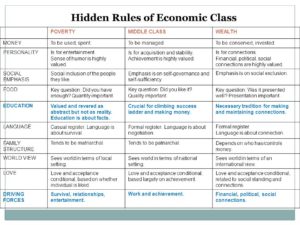Rubye Payne began training educators on the “hidden rules of classes” in her 2001 book, Bridges Out of Poverty.” As one considers these generalizations regarding socioeconomic differences about use of money, relationships, work, recreation, and more, individuals’ world views can be observed and discussed. Education, counseling, and other goals can be established to move them toward more productive and stable world view postures and living out of transformed values. . For many in life recovery, it is not just about substance use education and medication, it is about a transformed way of thinking. In our experience, that is best accomplished in a faith-infused, values-strengthening supportive community….not continuing to be corralled by society into the subculture that has perpetuated the life-limiting beliefs and behaviors. One must be offered a different view of how life can be lived and supported in growing into that new view of life. It will require leaving some people, places, and things behind…..but also filling the void with other people, places, and things that can help sustain the new choice of lifestyle. It can’t be done in isolation. Recovery is a community effort.
This insight from Rubye Payne’s book provided me the motivation to include curriculum units on values, ethics, change dynamics, job readiness, budgeting and money management, relationship patterns, overcoming co-dependency and more. The benefit of a small program like Titus 2 is that we can do more in-depth assessment of the needs of an individual and customize the teaching to meet her specific needs and to maximize her specific strengths.

![MPj04389070000[1]_phixr](http://disciplerofself.com/wp-content/uploads/2015/03/MPj043890700001_phixr.png)